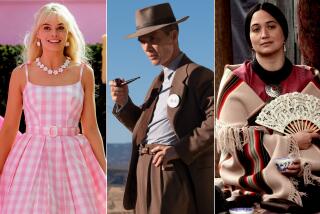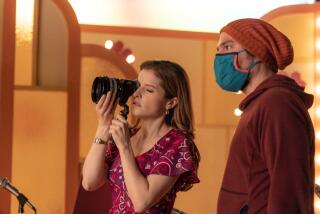Winger Stretches Out in ‘A Dangerous Woman’ : The actress gets the space to create a full-out portrait and is wonderful without being showy.
- Share via
Folksy movies about “disturbed” and possibly stunted screwballs are usually phony and patronizing, but “A Dangerous Woman” (selected theaters) is the intelligent exception. It’s about Martha Horgan (Debra Winger), who lives in the guest house of a ranch owned by her aunt Frances (Barbara Hershey) and wears thick eyeglasses and seems perpetually addled by the endless guile of humanity.
Martha herself is guileless; she speaks the truth at all times not so much by choice as by instinct. Her slight backwardness--the doctors have never came up with a clinical name for it--sets her apart from the townsfolk, but what really sets her apart is her improbably pure spirit. What drives her and everyone else a little batty is that her childlike openness is crossed with the privacies of a grown woman.
The film, adapted by screenwriter Naomi Foner from the 1991 Mary McGarry Morris novel and directed by Stephen Gyllenhaal, doesn’t undervalue Martha’s strangeness, it just sees beyond it. So does Winger. The material is booby-trapped with high-flown sanctimony about Martha’s “otherness” but, except for a couple of sequences, most notably near the end, the film never turns Martha into a saint or a standard bearer. It doesn’t cutesy-fy her torment. (Neither did the novel.)
Gyllenhaal places Martha at the film’s center and gives Winger the space to create a full-out characterization (for one of the few times in her career). She’s wonderful without being showy. She doesn’t play down to the audience or let us know she’s only kidding around. It’s a supremely unself-conscious portrayal of a woman who is supremely self-conscious. Martha observes everyone with a voyeur-like intensity but she also carries herself like someone who is constantly under surveillance. Wariness palls her features.
There’s an interconnectedness to people’s lives in this film, a buzz of shared emotion. The communal miseries are always in danger of teetering into “Peyton Place” territory but Gyllenhaal and Foner approach them from the inside, and that helps to give the film--rated R for “graphic sexuality, strong language and a scene of violence”--a freshness. (So does the plangent cinematography by Robert Elswit, which gives everything a warm, almost overheated glow.) Even when you can see where the film is going, it often catches you off balance, particularly in the ways in which it gets inside the ache of Martha’s sexual longings. It’s these longings that set “A Dangerous Woman” apart from most similarly themed movies. The film doesn’t “humanize” Martha by pretending she’s asexual.
*
Martha isn’t the only character in the film who aches. Frances, who watches over Martha with a ferocious hawk-like vigilance, is a deeply unhappy woman caught in a sordid, humiliating affair with a married state assemblyman (John Terry). She’s too smart for the fix she’s in and she knows it. But her weaknesses are the underside of her ferocity; that’s one reason she’s so protective--overprotective--of Martha. She understands the dangers of frailty.
When Mackey (Gabriel Byrne), an itinerant handyman, talks his way into patching up her ranch, he sets up an attraction with both women. Mackey is a bit too metaphorical a conceit for such a naturalistic movie--he’s like a D. H. Lawrence interloper, all Masculine Life Force--but he fits into this universe anyway. Maybe it’s because he turns out to be just as bollixed as everyone else. His scenes with Martha are tender and scary; these two walking wounded are captivated by intimacy but they can’t really handle the emotional fallout.
The black comedy in “A Dangerous Woman” is that Martha, who lives by the “truth,” is, in a sense, the sanest person in the movie--and yet it is her unwavering fixation on honesty that stigmatizes her. That’s what makes her a dangerous woman. (Without it, she’d just be the town screwball.) Through her eyes you see the other townspeople--including her best friend Birdy (Chloe Webb) and Birdy’s wandering-eyed boyfriend Getso (David Strathairn)--for what they are, not for what they pretend to be.
The filmmakers don’t take the material into the most upsetting and severe emotional regions the way, say, a Flannery O’Connor or a Carson McCullers might have, and that’s probably a limitation. There’s a feel-good falsity to parts of the film, particularly at the end, that doesn’t do justice to the sadness of Martha’s life. But the filmmakers are trying to transmute that sadness into something redeeming--something heroic--and it’s an understandable impulse. They prize Martha and, by the end, so do we.
‘A Dangerous Woman’
Debra Winger: Martha
Barbara Hershey: Frances
Gabriel Byrne: Mackey
David Strathairn: Getso
A Gramercy Pictures release. Director Stephen Gyllenhaal. Producer Naomi Foner. Executive producer Kathleen Kennedy. Screenplay by Naomi Foner. Cinematographer Robert Elswit. Editor Harvey Rosenstock. Costumes Susie DeSanto. Music Carter Burwell. Production design David Brisbin. Set designers Mary Finn, Renato Franceschelli. Set decorator Margaret Goldsmith. Running time: 1 hour, 51 minutes.
MPAA-rated R (graphic sexuality, strong language and a scene of violence).
More to Read
Only good movies
Get the Indie Focus newsletter, Mark Olsen's weekly guide to the world of cinema.
You may occasionally receive promotional content from the Los Angeles Times.










